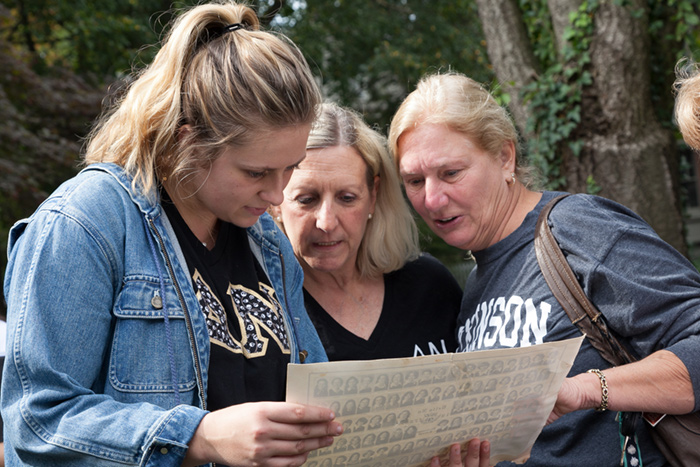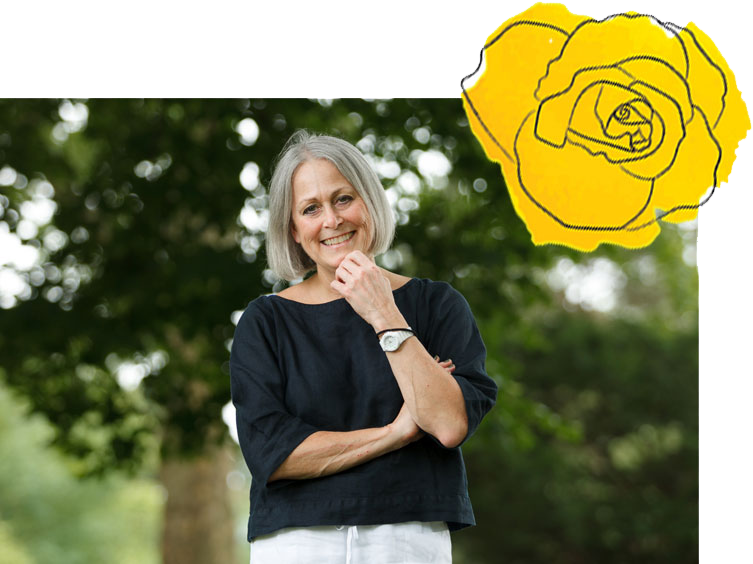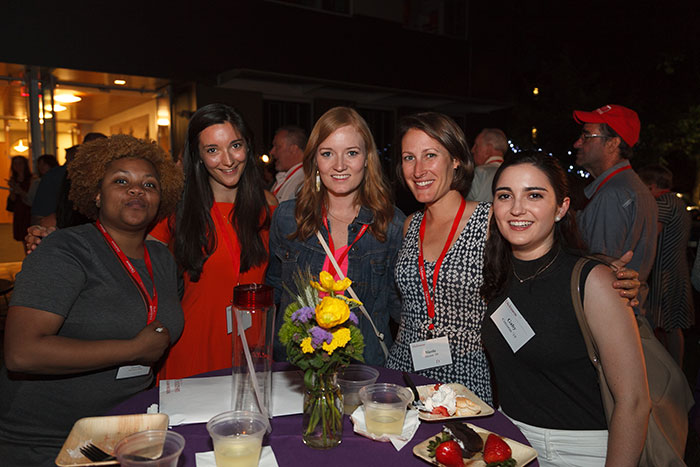Looking Back to Move Forward

Photo by Carl Socolow '77.
by Matt Getty
In October 1971, a group of young Dickinson women faced a challenge that would either define them or destroy them. The college’s Delta chapter of Chi Omega was recruiting an African-American woman, and the sorority’s national chapter was not happy about it. The battle lines were clearly drawn.
On one side stood a national sorority with a troubling history of opposing diversity. On the other stood a tightly knit group of 18- to 21-year-olds committed to inclusivity. Their options were clear: Stop recruiting the young woman, compromise their ideals and remain members; leave the sorority altogether; or disaffiliate from the national chapter and start a new sorority consistent with their values.

If that last choice seems like an easy answer, keep in mind that it carried with it the threat of being sued by the national chapter and losing all funding, housing, furniture—even the plates from which they ate.
“It was a very emotional debate,” recalls Barb Pim Bailey ’73. “There were a lot of tears shed. There were so many tough questions—what’s going to happen to our money, our apartment? At the same time, you had a lot of women who were saying, if we don’t do this, we’re going to leave the sorority because we don’t want to stay in an organization we can’t believe in.”
Needing a two-thirds majority to disaffiliate, they took a vote. Then, to be sure, they took it again. That was how Delta Nu was formed at Dickinson more than 45 years ago as a unique, local sorority with no national affiliations. The new sisters worked over the next year to elect new leaders, draft new bylaws, choose new traditions and—with the support of the college and an attorney—fairly split up resources with the national chapter.
Despite the struggle, one thing was certain—the women of Delta Nu had clearly defined themselves as an organization committed to the ideals of diversity, leadership and character. And new members noticed.
“Those girls were courageous,” recalls Carol Graebner ’75 who entered the new Delta Nu sorority that year. “I was so inspired by them. For me, it was a no-brainer to join and be with people who do the right thing.”
The same was true for Lindsey Goodman Iacovino ’75, who came to Dickinson opposed to Greek life. “Then I heard about a Dickinson chapter of a national sorority that, in its fight for social justice, had renounced its charter and founded a new, more inclusive organization,” she says. “I saw those women as warriors, and I wanted to be one of them.”

Carol Graebner ’75. Photo by Carl Socolow '77.
A Nu Challenge
For more than four decades, this was Delta Nu, a phoenix risen from the ashes of a controversial past to uphold values that shaped generations of young women at Dickinson. Then, in the spring of 2015, crisis struck again.
Having previously violated community standards, the sorority was charged with hazing and underage drinking. As the college scheduled a hearing to decide the organization’s fate, things didn’t look good. The independence that had been a defining strength in 1971 now posed a significant challenge.
“The problem is that without a national chapter, there was no one we could ask to swoop in and help,” explains Associate Vice President for Student Leadership & Campus Engagement Becky Hammell, who helped oversee the sorority’s disciplinary process. “The conventional wisdom is that local organizations like this can become a problem because they don’t have the backup and support they need. Here was a sorority with a great history, but it had suffered from vision and mission drift, and the question was where would we turn to help get it back on track?”
When the college notified Delta Nu alumnae about the sorority’s predicament, the answer to that question came back loud and clear.
“I had to get involved—there wasn’t even a choice,” says Jennifer Simpson Peterson ’93, who joined Delta Nu 20 years after Graebner and Iacovino but felt the same passion for its mission. “This legacy needed to continue.”
Peterson wasn’t alone. “The emails were just flying back and forth immediately,” Graebner says. “We knew we had to do something.”
“Our shared ideals will always be the bedrock of our sisterhood.” –Lindsey Goodman Iacovino ’75
“We all wrote back saying we were very interested in what was going on,” says Bailey. “We formed this sorority. We weren’t letting it die. We said, ‘We’ll do whatever we can.’ ”
Impressed with the outpouring of support, the college placed Delta Nu on stayed suspension. The sorority was barred from holding social events and recruiting new members, but it could fight its way back—with the help of those alumnae.
One condition of reinstatement, the college decided, was the formation of the Delta Nu Alumnae Advisory Board (DNAAB). In addition to meeting three times a year with the administration to discuss the sorority’s progress, the board would meet regularly with current Delta Nu sisters to provide the kind of guidance normally provided by a national chapter.
 Firsthand History
Firsthand History
Peterson teamed with Marisa Button ’04 and Sarah Glenn ’11 to reach out to more Delta Nu alumnae and form the board. That summer, more than 30 alumnae sisters returned to campus, and DNAAB officially launched with 15 members spanning four decades, all of them ready to work.
The next question was, how would the current sisterhood feel about this?
“They already have mothers, so they didn’t need us to be authority figures,” Graebner explains. “They needed us to be partners.”
If the current Delta Nus were at all skeptical of the board and its intentions, that all changed by October 2015, when several board members returned to campus to celebrate the sorority’s anniversary. Gathered in the sorority’s common room, which is affectionately known as the Pink Room, current sisters sat on the pink-carpeted floor as the DNAAB members told the story of Delta Nu’s founding. Though this had long been a tradition, this would be the first time the members would get the story directly from the women who lived it.
“Hearing our history firsthand brought tears to my eyes as well as many of my sisters’,” says Sally Matlock ’18, former Delta Nu president.
That reaction wasn’t lost on the advisory board. “That was a huge turning point,” says Bailey. “We knew they were listening.”
With DNAAB ready to guide and the current sisters ready to listen, the two sides worked together closely over the last two and a half years. DNAAB members offered professional expertise in arenas like corporate governance, business and education to help the sorority revise its constitution, define risk-management procedures and standardize new-member education. With three face-to-face meetings each year and numerous conference calls, DNAAB helped the current Delta Nu sisters manage their suspension so well, in fact, that the sorority was able to begin recruiting new members earlier than expected.
“These women provide guidance, mentorship, stability and inspiration,” explains Jennifer Love, Dickinson’s associate director of alumni relations, who serves as an administrative advisor to DNAAB and Delta Nu along with Director of Admissions Communications Angie Fernandez Barone ’90. “They gave the sisterhood a foundation by setting organizational standards.”

Vital Values
At the heart of those standards were the sorority’s core values of sisterhood, academic achievement, social consciousness, community service and leadership. By connecting chapter officers with alumnae experts, creating networking and mentoring opportunities and providing leadership retreats, DNAAB translated an appreciation for the sorority’s history into guiding principles for its future.
“More important than remembering our secret handshake,” says Debby Batchelder Seme ’77, “is remembering what brought us together and how we can still come together when we need each other.”
The results have been dramatic. Now 105 members strong, Delta Nu is scheduled to come off stayed suspension this May. Last Alumni Weekend, DNAAB’s efforts also earned the college’s 1783 Award, which honors alumni volunteers with “demonstrated success in both quality and quantity of volunteer service to the college.” But the board’s members are quick to point out that the current sisters are just as responsible for this turnaround story.
“They really embraced this and did the work,” says Graebner. “They owned up to the sorority’s problems, and they worked very hard to change their culture. We were just there to back them up.”
Iacovino agrees. “I have felt such pride in watching the next generation of Delta Nus embrace our core values of diversity, inclusion and empowerment,” she says. “These young women really get it. The song lyrics and rituals may evolve a bit over the years, but our shared ideals will always be the bedrock of our sisterhood.”

The current sisters, however, insist that DNAAB deserves the lion’s share of the credit.
“Delta Nu sorority would not be where we are today—or even exist anymore—without the strength and perseverance of DNAAB,” says current Delta Nu President Lucy Paterson ’19. “They were our saving graces.”
An added benefit, all of the DNAAB members agree, was deepening their relationships with one another. “The reconnection with alumnae from my era has been heartwarming to me,” explains Trish Godfrey Swigart ’75. “It is amazing, the bond that still exists between us. We picked up right where we left off over 45 years ago.”
Supporting the Future
Having turned to the past to redirect its present, Delta Nu is now focused on partnering with DNAAB to shape the future. To honor this remarkable turnaround as well as Delta Nu’s legacy, the sorority and the advisory board recently launched the Delta Nu Scholarship Fund. They’re currently reaching out to alumnae for gifts aimed at establishing a $100,000 permanently endowed fund to provide scholarship support to students upholding the sorority’s values.
“Now we have the opportunity to be something different,” says Bailey, noting that they hope to reach the $100,000 goal in time for Delta Nu’s 50th anniversary in 2021. “We have the opportunity to go beyond our own Delta Nu community and help the wider Dickinson community.”
Even once Delta Nu is fully reinstated, DNAAB will continue to advise the current sisters and take on new board members who will serve as future mentors. In that way, it’s poised to continue to highlight the positive role alumni can play in student life—in fraternities and sororities and beyond.
“Having an alumni advisory board—even for other campus organizations—provides intergenerational support that can do a lot of good,” says Hammell. “This is a great model of how current students can really benefit from alumni involvement.”
“Delta Nu Alumnae, current Delta Nu sisters, our friends, parents, children and anyone else may give to the
To support the Delta Nu Scholarship Fund, visit Dickinson's giving form, choose “other” in the drop down box and type in “Delta Nu Scholarship Fund.”
DNAAB Members
Current Members
- Julie Alexander ’80
- Barb Pim Bailey ’73
- Sara Barakat ’81
- Gail Fricke Dorosh ’80
- Chris Gehrett Falvello ’73
- Carol Graebner ’75
- Lindsey Goodman Iacovino ’75
- Gigi Jensen ’80
- Sandy Smith McGrew ’73
- Colleen Miller ’81
- Nicole Mount ’09
- Rachel Pickering ’00
- Debby Batchelder Seme ’77
- Trish Godfrey Swigart ’75
- Jessica Walls Tuel ’07
Former Members
- Marisa Button ’04
- Sarah Glenn ’11
- Jennifer Simpson Peterson ’93
 Widely regarded as an emblem of friendship, the yellow rose has been one of Delta Nu’s core symbols since the sorority was founded at Dickinson.
Widely regarded as an emblem of friendship, the yellow rose has been one of Delta Nu’s core symbols since the sorority was founded at Dickinson.
Read more from the spring 2018 issue of Dickinson Magazine.
TAKE THE NEXT STEPS
Published April 18, 2018